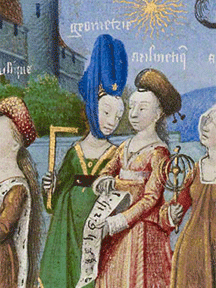An Interview with the 2014 Walter J. Jensen Fellow
By Alex Silverman
Love, as we know it, is medieval. Not exactly your everyday mantra, this sentiment is neither spray-painted in back-alley streets, nor posted or reposted on social media. And yet, it could not be more pertinent to modern-day life. Although love is an integral part of who we are, a subject of our dramas, a driving force in our lives, its origin — that is to say — the knowledge of where, when, how, and why our conceptions of love and sexuality developed, is strangely lacking from our lives.
Charles Samuelson, a graduate student in French at Princeton University and the recipient of the 2014 Walter J. Jensen Fellowship for French Language and Culture, seeks to change this. “Love became the major subject of narrative in the Middle Ages,” he says, “and it wasn’t before. Putting love and sexuality front and center is medieval. This is where love as we know it, this is where sexuality as we know it — Western European culture — came from.”
Samuelson stresses just how misunderstood the Middle Ages are as a pivotal moment in the development of Western culture. “We were way more wrong about [the Middle Ages] than we would have expected. There were definitely openly gay subcultures and probably openly gay marriages in the 12th century,” he explained. It is on this notion of tolerance in the Middle Ages that Samuelson bases his research.
In “Partonopeus de Blois and La Prison Amoureuse: Queering Narratology in Verse Romances and the Dits,” Samuelson seeks to reexamine Old French texts through the dual lenses of narratology and modern-day queer theory. While Samuelson agrees that his assertions of tolerance in the Middle Ages have largely been substantiated through the work of other medievalists and scholars, he acknowledges that his ideas continue to challenge popular opinion. In particular, his chosen conduits for study (narratology and queer theory) attract skepticism.
The application of contemporary gender theory to medieval literature is, perhaps, an unconventional critical approach studying Old French texts. However, Samuelson feels that medieval literature is a prime subject for it. The fact that both gender and sexuality are so prominent in medieval literature where “the major opposition is a knight going after a lady,” Samuelson remarked, makes medieval literature ideal for gender study. Samuelson feels that our notions of gender theory, like love, are rooted in developments that occurred in the Middle Ages.
Similarly, the lens of narratology has chiefly focused on modern literature, and as such receives skepticism when applied to medieval literature. Samuelson further explains that narratology “has traditionally been completely uninterested with questions of content,” as well. In addition, scholars often interpret medieval texts as blindly supportive of a ‘medieval status quo’. Indeed, most texts are viewed as little more than propaganda for the political circumstances of the time. However, Samuelson strives to examine how narrative challenges were instead a conception of medieval tolerance. “They were thinking way more critically than we tend to think. I strongly believe, [medieval literature] is very often, and in all the best cases it is, questioning, resisting, mocking, parodying, etc.”
With Samuelson’s findings comes not only a historical reappreciation of marriage, love, and sexuality, but also a better understanding of ourselves. Samuelson feels that observing how the Middle Ages portrayed the relationship of language and narrative to culture and sexuality, “should teach us about where we come from… The idea is to learn from people who’ve thought critically in the past, and to think more critically ourselves about these people from the past… To encourage people to be thinking more critically about the way we do things, and have done things, in order to make this a better place.”
Samuelson credits his professor and advisor for their continued support throughout his academic career and exploration with the French language. “I’ve been lucky over and over again with French and with French Literature,” Samuelson says. He thanks Phi Beta Kappa for this opportunity and for making his research possible. “I’m extremely grateful for this support,” he says, “and I really really look forward to get to France and getting started.”
Alex Silverman is a recent graduate of Wofford College in humanities and German. He became a member of Phi Beta Kappa in his senior year. Wofford College is home to the Beta of South Carolina Chapter of Phi Beta Kappa.




